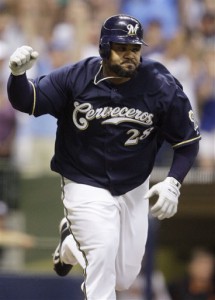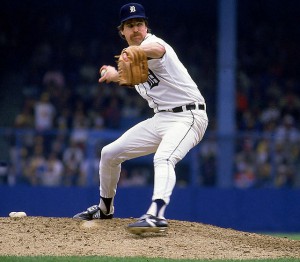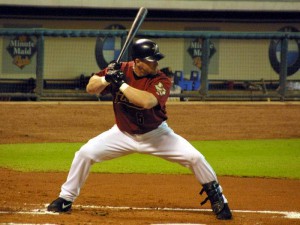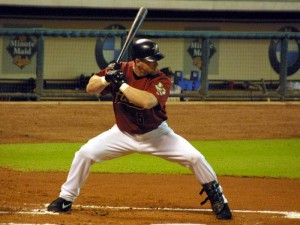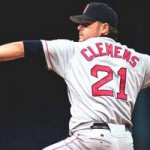
Roger Clemens; is he a Hall of Famer or an opportunity for writers to make a PED statement? Photo unknown.
Obligatory Class of 2013 Hall of Fame opinion piece.
The 2013 Hall of Fame class ballot was released in Late November, on BBWAA’s site. Here’s the 2013 class on Baseball-Reference.com, along with relevant career stats and past voting results.
As we’re about to read, over and over again from every writer in the Baseball world, this is the Steroid-era ballot. Several of the biggest names of the era are on the ballot. Just in case you were wondering who has or hasn’t been officially linked to PEDs, here’s a handy guide for your ethical dilemma.
My Previous posts on the same topic:
- Recent post on Jack Morris and what the Hall of Fame really means.
- 2012 Class: post on who I’d vote for with my imaginary ballot.
- 2011 Class: My post specifically on Bert Blyleven (who I didn’t like for the hall) and then thoughts on the rest of the class.
I typed up such exhaustive opinions on a number of candidates from the two previous versions of these posts, that I won’t repeat them here. Instead i’ll just state below, of the returning candidates this year here’s who I’d vote for and who I wouldn’t in list form.
Returning Candidates I’d vote for:
- Jeff Bagwell
- Jack Morris
- Tim Raines
- Mark McGwire
- Edgar Martinez
Returning Candidates that I would NOT vote for (my reasons mostly are stated in the 2012 class post referenced above):
- Bernie Williams
- Alan Trammell
- Lee Smith
- Larry Walker
- Rafael Palmeiro
- Don Mattingly
- Fred McGriff
- Dale Murphy
New Candidates in 2012 that I’d vote for, with some discussion; Unlike a lot of opinions I state, my thoughts on the Hall of Fame have always been more driven by how a player “seems” to be in the pantheon of baseball history. I don’t like to get into the same stats-driven discussions that other writers do. So and so had a career WAR of X, or a career ERA+ of Y, which makes him better than this other guy.
- Barry Bonds: A transcendent player before any use of “the cream” or “the clear,” this 7-time MVP is clearly in the pantheon of the greatest players of all-time. The best 5-tool player since Willie Mays, the only thing that should have been standing in the way of unanimous voting is Bonds’ surly nature towards sports writers (several of whom would have “penalized” him by omitting him from first ballot status).
- Roger Clemens: replace “7-time MVP” with “7-time Cy Young winner” and the Bonds argument essentially repeats itself with Clemens. Normally we’d be talking about his place as one of the greatest right handed pitchers to ever play the game. Instead we’re talking about how much of his later career was enhanced by virtue of foreign substances.
- Mike Piazza: One of the best 3 hitting catchers of all time (Johnny Bench being the best, with Yogi Berra in the discussion), his purported “back acne” proof of steroid use likely costs him votes. Which is just ridiculous, but that’s the nature of this ballot and the next 15 year’s worth of ballots unfortunately.
- Curt Schilling: his career accomplishments don’t include a Cy Young award, but that wasn’t for lack of trying; he just happened to pitch in the same ERA as Randy Johnson and Johan Santana in his prime power. But Schilling was a game-changing starter, an Ace who could get you the win. He was one of the biggest “big game” pitchers out there. And, his legendary playoff performances push him over the top for me. Some will argue against him b/c he “only” had 216 wins or he “only” had a career 3.46 ERA. He passes the eye test for me.
- Craig Biggio: he wasn’t the flashiest player, but then again you can’t judge middle infielders the same way as you judge power hitters. Biggio hit the 3,000 hit plateau, was a good combination of power (291 career homers) and speed (414 career SBs), and showed good defense (several Gold Gloves). For one of the last career one-team guys, he makes the cut for me.
New Candidates that I would NOT vote for:
- Sammy Sosa: 600+ career homers, and I can’t help but think that a good number of those were either PED or corked-bat assisted. That’s probably completely unfair, but you can make a good argument that more than 150 of his career homers were likely “surplus” to his legitimate career capabilities. He averaged 37 homers/season as he approached his prime, then suddenly averaged 60/season for four seasons. Clearly Bonds’ 73-homer season is attributable to a single-season PED spike, but Sosa made a career of it. There’s just no way for me to distinguish who the real Sosa was (he had a 99 OPS+ the year before his power spike) versus the PED enhanced version.
- Kenny Lofton: I know lots of people view Lofton in the same breath as Rickey Henderson in terms of quality lead-off hitters, but to me he was just a vagabond who kept looking for work year after year. He played for 12 teams by the time he hung them up. Perhaps I’m not really “remembering” his time in Cleveland, where he stole a ton of bases and set the table for that powerful lineup. He had a handful of gold gloves, a handful of all-star appearances. I may be under-appreciating him a bit, but when I hear his name I don’t knee-jerk Hall of Famer.
- Everyone else first time eligible, the best player of which is probably David Wells. Wells basically had two good seasons (the only two times he received any Cy Young consideration) and otherwise was a rubber-armed hurler who prided himself on making 35 starts despite being in god-awful shape (as noted extensively in Joe Torre‘s book The Yankee Years).
I’d be shocked if anyone else on the first time eligible list got enough votes to even stay eligible for 2014’s ballot.
Critics may state that my fake ballot has some inconsistencies; how can I support a vote for Biggio but not for Trammell? How can you vote for McGwire but not Sosa? How can you vote for Edgar Martinez but not Larry Walker? How can you vote for *any* PED guys but shun Sosa and Palmeiro? How can you support Morris but not support Wells? All these are good points; good arguable points. Maybe if I had an official ballot I’d have a more serious discussion with myself about these points. All the above thumbs-up/thumbs-down opinions are mostly knee jerk, did the guy “feel” like a hall of famer as opposed to a full statistical analysis. As I covered in my Jack Morris piece, I think its ok to have slightly lesser players who contributed more to the baseball pantheon than slightly better players statistically who had no real lasting impact on the game.
And for now, that’s good enough for me and my fake Hall of Fame ballot.
